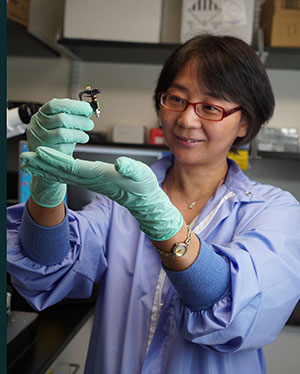
Yun Li, an assistant professor in the University of Wyoming’s Department of Zoology and Physiology, recently received a $2.25 million National Institutes of Health (NIH) RF1 grant to advance her Alzheimer’s disease research.
The RF1 grant provides the initial three years of support for her research titled “Loss of TDP-43 disrupts the prefrontal neural activity and circuitry: relevance for TDP-43 linked ADRD.” NIH’s National Institute of Neurological Disorders and Stroke funds Li’s research.
The project will determine the earliest changes to neural activity and the brain network of Alzheimer’s disease (AD) and Alzheimer’s-related dementias (ADRD) associated with TDP-43 pathology. TDP-43 -- TAR DNA-binding protein 43, a DNA-/RNA-binding protein with a molecular weight of 43 kDa (kilodalton) -- is a multifunctional nucleic acid-binding protein linked to AD/ADRD.
In 2006, TDP-43 was identified as the major pathogenic component in most common subtypes of frontotemporal dementia and amyotrophic lateral sclerosis (ALS), also known as motor neuron disease. Later, TDP-43 pathology also was found in 30 percent to 57 percent of Alzheimer’s patients who usually displayed exacerbated cognitive declines and worse brain atrophy.
“Successful completion of this project will likely identify novel therapeutic targets and effective therapeutic strategy to attenuate these devastating disorders of the elderly,” Li says.
Alzheimer’s and ADRD are the most common forms of dementia. They impair memory, thought process and functioning in afflicted individuals, primarily older people.
“Currently, there is no effective treatment nor prevention for these devastating brain diseases,” Li says.
Li’s project will use mouse models of AD/ADRD mimicking the human TDP-43 pathology to determine the earliest changes to neuronal activity and the brain network. Research is conducted in the Li Lab in UW’s Biological Sciences Building.
“Mouse brains share a high similarity with the human brain at levels of both the structure and connectivity,” Li says.
Her team will use miniscope-imaging technology to study AD/ADRD mouse brains to record the real-time neural activity of mice at different disease stages.
“Discoveries from this project will help us understand how AD/ADRD diseases process in neural circuits of the intact living brain, paving ways to treat and, ultimately, prevent these disorders,” she says.
Li started working with mouse models of AD/ADRD in 2010 as a postdoctoral fellow in the Department of Neurology at the Johns Hopkins University School of Medicine. As a principal investigator, she has continued this line of research at UW the past four years. Her research program has been supported by UW startup funds and the NIH-funded Phase I Sensory Biology Center of Biomedical Research Excellence at UW. This is her first NIH RF1 grant.
“Getting this grant is often a challenge and an important milestone for a junior faculty member,” she says. “The RF1 budget and scope will significantly move the research project forward to have significant impact to the field.”
The grant will help the research team’s growth and will support two to three graduate students and three to four undergraduate students working in the lab. Rongsong Liu, a UW mathematics professor, who serves as the project’s co-principal investigator, is on Li’s research team.
Students working in the Li Lab are Rashmi Thapa, from Hetauda, Makawanpur, Nepal, and Navin Adhikari, from Ranigaun, Tanahun, Nepal, who are doctoral students in the neuroscience graduate program; Casper’s Sierra McOmie, who recently graduated from UW in microbiology; and Hunter Swilling, a physiology and molecular biology undergraduate student from Cheyenne.

